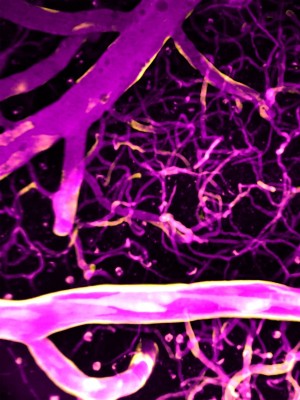March 28, 2019 | Joanne Morrison

Dr. Margaret McCarthy’s Research Sheds Light on Brain Development Between Males and Females
Researchers at the University of Maryland School of Medicine and colleagues at Ohio State University have discovered that allergic reactions trigger changes in brain behavior development in unborn males and females. This latest brain development discovery will ultimately help researchers better understand how neurological conditions can differ between men and women.
It is the first study to assess the response of a type of immune cell called a mast cell, linked to allergic responses, to determine if these cells play a role in sexual behavior development.
 “Many mental health and neurological disorders show a sex bias in prevalence, this latest research shows that inflammatory events, like allergic reactions, early in life may influence males and females differently due to underlying sex differences in the neuro immune system,” said Margaret McCarthy, PhD, Professor of Pharmacology and Chair of the Department of Pharmacology, whose lab conducted the research that was initiated by Dr. Katherine Lenz, an Assistant Professor in the Department of Psychology at Ohio State University.
“Many mental health and neurological disorders show a sex bias in prevalence, this latest research shows that inflammatory events, like allergic reactions, early in life may influence males and females differently due to underlying sex differences in the neuro immune system,” said Margaret McCarthy, PhD, Professor of Pharmacology and Chair of the Department of Pharmacology, whose lab conducted the research that was initiated by Dr. Katherine Lenz, an Assistant Professor in the Department of Psychology at Ohio State University.
These findings, which were published in Scientific Reports, illustrate that immune cells are involved in the process of brain sexual differentiation, and that prenatal allergic inflammation can impact this crucial process in both sexes. This finding is another discovery that will ultimately help researchers understand behavioral development differences between males and females.
How Allergic Reactions Impact Sexual Behavior
Researchers tested the sexual differentiation in rats that were exposed to an allergic reaction while still in utero. They induced an allergic reaction to egg whites in pregnant rats, and results of the study showed the allergic reaction impacted behavior changes in the offspring. Male rats showed less male sexual behavior as adults and adult females behaved more like male rates.
The research tracked mast cells, which are known for their role in allergic responses. Researchers sought to determine if exposure to an allergic response of the pregnant female in utero would alter the sexual differentiation of the offspring and result in sociosexual behavior in later life.
“This research shows that early life allergic events may contribute to natural variations in both male and female sexual behavior, potentially via underlying effects on brain-resident mast cells,” said Dr. McCarthy.
Sexual differentiation takes place in the early life process and it is directed by sex chromosomes, hormones and early life experiences. What this research showed is that immune cells residing in the brain such as microglia and mast cells, are more numerous in the male than female rat brains, and these cells play a critical role in brain development.
“This research is an important discovery in the science behind brain development in males and females as we address brain disorders early in life. It builds upon the research at the University of Maryland School of Medicine, that uncovers how male and female brains differ, which will ultimately help in treating a wide range of serious brain disorders,” said UMSOM Dean E. Albert Reece, MD, PhD, MBA, who is also the Executive Vice President for Medical Affairs, University of Maryland, and the John Z. and Akiko K. Bowers Distinguished Professor.
The research was funded by the National Institutes of Health and The Ohio State University Startup Funds to KML.
About the University of Maryland School of Medicine
Now in its third century, the University of Maryland School of Medicine was chartered in 1807 as the first public medical school in the United States. It continues today as one of the fastest growing, top-tier biomedical research enterprises in the world -- with 43 academic departments, centers, institutes, and programs; and a faculty of more than 3,000 physicians, scientists, and allied health professionals, including members of the National Academy of Medicine and the National Academy of Sciences, and a distinguished recipient of the Albert E. Lasker Award in Medical Research. With an operating budget of more than $1 billion, the School of Medicine works closely in partnership with the University of Maryland Medical Center and Medical System to provide research-intensive, academic and clinically based care for more than 1.2 million patients each year. The School has over 2,500 students, residents, and fellows, and more than $530 million in extramural funding, with most of its academic departments highly ranked among all medical schools in the nation in research funding. As one of the seven professional schools that make up the University of Maryland, Baltimore campus, the School of Medicine has a total workforce of nearly 7,000 individuals. The combined School and Medical System (“University of Maryland Medicine”) has an annual budget of nearly $6 billion and an economic impact more than $15 billion on the state and local community. The School of Medicine faculty, which ranks as the 8th highest among public medical schools in research productivity, is an innovator in translational medicine, with 600 active patents and 24 start-up companies. The School works locally, nationally, and globally, with research and treatment facilities in 36 countries around the world. Visit medschool.umaryland.edu
Contact
Department of Anesthesiology
(410) 328-6120 (phone)
(410) 328-5531 (fax)
swalsh@som.umaryland.edu
Joanne Morrison
Director of Marketing and Public Relations
University of Maryland School of Medicine
jmorrison@som.umaryland.edu
Office: (410) 706-2884
Mobile: (202) 841-3369
Related stories

Wednesday, April 02, 2025
Researchers Reveal Key Brain Differences to Explain Why Ritalin Helps Improve Focus in Some More Than Others
Nearly 16 million American adults have been diagnosed with attention deficit hyperactivity disorder (ADHD), but evidence suggests that more than 30 percent of them don’t respond well to stimulant medications like Ritalin and Adderall. A new clinical trial provides a surprising explanation for why this may be the case: There are individual differences in how our brains circuits are wired, including the chemical circuits responsible for memory and concentration, according to a new study co-led by the University of Maryland School of Medicine (UMSOM) and performed at the National Institutes of Health (NIH) Clinical Center.

Tuesday, April 25, 2023
Immune System Sculpts Rat Brains During Development
Researchers have established that biological sex plays a role in determining an individual’s risk of brain disorders. For example, boys are more likely to be diagnosed with behavioral conditions like autism or attention deficit disorder, whereas women are more likely to suffer from anxiety disorders, depression, or migraines. However, experts do not fully understand how sex contributes to brain development, particularly in the context of these diseases. They think, in part, it may have something to do with the differing sizes of certain brain regions.

Friday, March 31, 2023
Traumatic Brain Injury Interferes with Immune System Cells’ Recycling Process in Brain Cells
Each year about 1.5 million people in the U.S. survive a traumatic brain injury due to a fall, car accident, or a sports injury, which can cause immediate and long-term disability.

Friday, January 06, 2023
UM School of Medicine Scientists Create First Extensive Brain Cell Data Repository
Neuroscience researchers now have access to 50 million brain cells to better understand how the brain develops and functions or changes with disease or trauma. Last month, scientists at the University of Maryland School of Medicine’s (UMSOM) Institute for Genome Sciences (IGS) unveiled a “one-stop shop” for brain cell data called the Neuroscience Multi-Omic Archive (NeMO Archive). This archive is now available to neuroscience researchers to transform their understanding of the complex workings of the brain.

Monday, December 12, 2022
University of Maryland School of Medicine Launches New Maryland Institute for Neuroscience Discovery (UM-MIND)
University of Maryland School of Medicine (UMSOM) Dean Mark T. Gladwin, MD, has announced plans to launch a new neuroscience institute that will accelerate translational research of the brain by facilitating interaction between basic and clinical scientists and enhancing collaborative research across the UMSOM and University of Maryland, Baltimore (UMB) campus.

Monday, November 14, 2022
Brain Area Thought to Impart Consciousness, Behaves Instead Like an Internet Router
Tucked underneath the brain’s outer, wrinkly cortex is a deeply mysterious area, known as the claustrum. This region has long been known to exchange signals with much of the cortex, which is responsible for higher reasoning and complex thought. Because of the claustrum’s extensive connections, the legendary scientist Francis Crick, PhD, of DNA-discovery fame, first postulated in 2005 that the claustrum is the seat of consciousness. In other words, the region of the brain enabling awareness of the world and ourselves.

Wednesday, July 21, 2021
University of Maryland School of Medicine Study Finds Calcium Precisely Directs Blood Flow in the Brain
University of Maryland School of Medicine and University of Vermont researchers have shown how the brain communicates to blood vessels when in need of energy, and how these blood vessels respond by relaxing or constricting to direct blood flow to specific brain regions.

Tuesday, June 08, 2021
IN MEMORIAM: UM School of Medicine Biomedical Research Pioneer and Pharmacology Professor, Laure Aurelian, PhD
The Department of Pharmacology at the University of Maryland School of Medicine (UMSOM) is saddened to announce the passing of Laure Aurelian, PhD, Professor Emerita of Pharmacology. She was the first woman to receive a PhD from the Johns Hopkins University School of Medicine and was a pioneer who opened doors for many women to pursue research careers in biomedical science. She was also among the first women to receive independent funding from the National Institutes of Health, receiving her first R01 award in 1970.

Wednesday, October 21, 2020
UM School of Medicine Postdoctoral Fellow Awarded Prestigious AAAS Science and Technology Policy Fellowship
Ryan Richardson, PhD, Postdoctoral Fellow, Department of Pharmacology, at the University of Maryland School of Medicine (UMSOM) was awarded a highly prestigious American Association for the Advancement of Science (AAAS) Science & Technology Policy Fellowship (STPF), placing him at the National Institutes of Health (NIH)’s Brain Research through Advancing Innovative Neurotechnologies (BRAIN) Initiative for a year.

Wednesday, September 25, 2019
Dr. Tracy Bale Elected President of the International Brain Research Organization
Tracy L. Bale, PhD, Professor of Pharmacology and Director of the Center for Epigentic Research in Child Health & Brain Development has been elected President of the International Brain Research Organization.

Friday, September 06, 2019
UMSOM's Dr. Margaret McCarthy Awarded Indiana University's Gill Transformative Investigator Award for Neuroscience Research
Indiana University’s Gill Center for Biomolecular Science has given Margaret McCarthy, PhD, The James & Carolyn Frenkil Endowed Dean’s Professor and Chair of the Department of Pharmacology at the University of Maryland School of Medicine (UMSOM), The Gill Center for Biomolecular Science 2019 Gill Transformative Investigator Award.

Monday, April 29, 2019
UMSOM’s Reading on the Brain Program Teaches Baltimore City Elementary Students About the Brain-Building Power of Reading
Acting Baltimore City Mayor Jack Young joined 4th and 5th grade students at Callaway Elementary School to help paint a mural about the brain. It was all part of Reading on the Brain, a University of Maryland School of Medicine (UMSOM) program to teach young students about the importance of reading and how reading can stimulate brain development and inspire future success. Tracy Bale, PhD, is leading the pilot program, which also emphasizes science and helps children to understand how the brain works.

Thursday, April 04, 2019
Margaret "Peg" McCarthy, PhD, is Invested as the Second James and Carolyn Frenkil Dean's Professor
In front of a standing ovation at Westminster Hall on March 26, Margaret McCarthy, PhD, Professor and Chair of the Department of Pharmacology, became the second University of Maryland School of Medicine (UMSOM) faculty member to hold the James and Carolyn Frenkil Dean’s Professorship. The two professorships, made possible by the generosity of UMSOM Board of Visitors member and longtime philanthropist Carolyn B. Frenkil, were established to recognize distinguished faculty in the basic sciences. The ceremony followed the investiture of James Kaper, PhD, Professor of Microbiology and Immunology, in March.

Friday, March 01, 2019
UMSOM Researchers Discover Clues to Brain Differences Between Males and Females
Researchers at the University of Maryland School of Medicine have discovered a mechanism for how androgens -- male sex steroids -- sculpt brain development. The research, conducted by Margaret M. McCarthy, Ph.D., Professor of Pharmacology and Chair of the Department of Pharmacology, could ultimately help researchers understand behavioral development differences between males and females.

Tuesday, September 11, 2018
New Study Finds Unexpected Link Between Immune Cells and Male/Female Differences
Researchers at the University of Maryland School of Medicine (UMSOM) have made a surprising discovery: during fetal development, a particular immune cell seems to play a key role in determining the male or female characteristics of the brain.

Tuesday, July 31, 2018
University of Maryland School of Medicine Establishes Two Endowed Professorships Through Private Gifts and Matching State Funds
University of Maryland School of Medicine (UMSOM) Dean E. Albert Reece, MD, PhD, MBA, announced today that the school has been awarded matching funds from the Maryland E-Nnovation Initiative Fund (MEIF), administered by the Maryland Department of Commerce. The funds, when combined with private philanthropy, will enable UMSOM to establish two new endowed professorships – one in Microbiology and Immunology, and one in Pharmacology.

Monday, July 16, 2018
Microbes from Birth Canal May Affect Stress Levels of Offspring
Researchers have long known that stress during pregnancy may be transferred from the mother to her offspring. Many studies have shown that this stress can have long-lasting impacts on the physical and emotional health of the offspring. However, the mechanisms of this transfer have remained mysterious. A new study has unraveled one possible way in which these effects move from mother to child.

Wednesday, July 11, 2018
Scientists Identify Mechanism That May Explain Why Males Have a Higher Risk for Neurodevelopmental Disorders
Researchers have recently begun to realize that biological sex plays a key role in disease risk. Sex differences play a role in hypertension, diabetes, arthritis – and in many neurological and psychiatric disorders. Depression and anxiety affect females more, while neurodevelopmental disorders, including autism spectrum disorders, early onset schizophrenia, and attention deficit hyperactivity, affect more males. Males are also more sensitive to issues during pregnancy, such as maternal stress, maternal infection and exposure to drugs.

Friday, June 15, 2018
Acting Chairs Appointed for Pharmacology and Physical Therapy Departments During Chair Sabbaticals
University of Maryland School of Medicine (UMSOM) Dean E. Albert Reece, MD, PhD, MBA, announced today that two department chairs, Margaret McCarthy, PhD, Professor and Chair, Department of Pharmacology, and Mark Rogers, PhD, PT, FAPTA, the George R. Hepburn Dynasplint Professor and Chair, Department of Physical Therapy and Rehabilitation Science (PTRS), will be taking sabbatical leave during the 2019 fiscal year. In making the announcement, Dean Reece noted that acting chairs have been named to provide leadership in these two departments during this period.

Thursday, May 03, 2018
Renowned Journalist Nicholas Kristof Speaks on Justice and Society
Renowned New York Times journalist Nicholas Kristof will speak on May 3 at the Peabody Library in Baltimore on the need to build a fairer society.

Thursday, March 01, 2018
Increased Stress on Fathers Leads to Brain Development Changes in Offspring
New research in mice has found that a father’s stress affects the brain development of his offspring. This stress changes the father’s sperm, which can then alter the brain development of the child. This new research provides a much better understanding of the key role that fathers play in the brain development of offspring.

Thursday, December 07, 2017
University of Maryland School of Medicine Scientists Identify the First Brain Cells to Respond to Sound
Some expectant parents play classical music for their unborn babies, hoping to boost their children’s cognitive capacity. While some research supports a link between prenatal sound exposure and improved brain function, scientists had not identified any structures responsible for this link in the developing brain.
